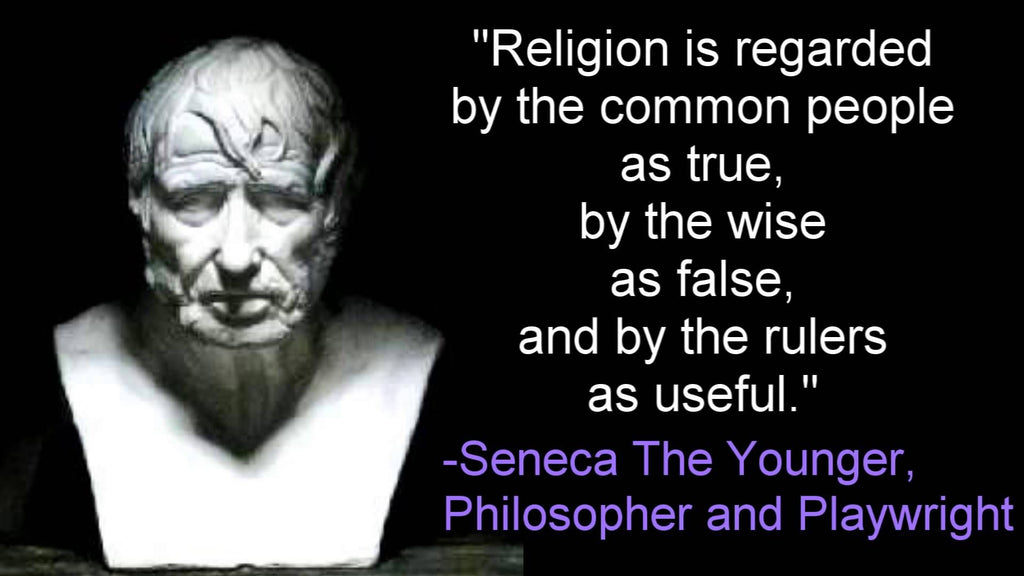We asked GPT-4 to answer these questions on the famous Seneca religious quotation
"Religion is regarded by the common people as true, by the wise as false, and by rulers as useful. — Seneca"
Provide an analysis of the morality of religion and any pitfalls or opportunities it may present to:
- the common people who believe it to be true,
- the wise who believe it to be false,
- and the rulers who think it useful.
Which of these groups is most likely to benefit from religion and why?
Which of these groups is most likely to suffer from religion and why?
-------------------------------------------------------------------------------------------------------
Seneca's quote "Religion is regarded by the common people as true, by the wise as false, and by rulers as useful" provides an interesting starting point for discussing the morality of religion and its effects on different groups of people.
It is important to keep in mind that this analysis is based on Seneca's quote and does not necessarily reflect the objective truth about religion.
For the common people who believe religion to be true, religion can provide a moral framework, hope, and a sense of belonging to a community.
This group may benefit from religion as it can offer guidance in times of difficulty, solace in times of grief, and a sense of purpose in life.
However, pitfalls for this group may include blind adherence to dogma, intolerance towards other beliefs, or being manipulated by those in power.
For the wise who see religion as false, they might benefit from their skepticism and rationality, enabling them to critically analyze religious teachings and differentiate between the helpful and the harmful.
This perspective could potentially lead to a more nuanced understanding of morality, ethics, and human nature.
However, the pitfalls for this group might include a sense of alienation from religious communities, cynicism, or a lack of spiritual fulfillment.
For rulers who find religion useful, they may use it as a means to maintain social order, unite people under a common belief system, and legitimize their authority.
Rulers might benefit from this perspective by effectively utilizing religion to achieve political goals and maintain stability.
However, the potential pitfalls for rulers include manipulating religious beliefs for personal gain, perpetuating harmful dogma, or using religion as a tool for oppression.
In terms of which group is most likely to benefit from religion, it would largely depend on the specific context and the nature of the religion in question.
For some common people, religion can provide a sense of community, purpose, and moral guidance, offering a framework for living a meaningful life.
It can also serve as a source of comfort during difficult times and help people face adversity with strength and resilience.
In these cases, the common people would benefit significantly from religion.
For the wise, even if they regard religion as false, they may still benefit from the philosophical and ethical discussions that arise from religious texts or debates.
Engaging with religious ideas can stimulate intellectual growth and provide an opportunity to examine one's own beliefs, values, and worldview.
In this way, the wise can benefit from religion as a source of intellectual enrichment.
Rulers who view religion as useful often leverage it to maintain social order, promote moral values, or rally support for their cause.
By aligning their rule with divine authority or religious principles, they can garner legitimacy and maintain their power.
Therefore, rulers may benefit from religion in terms of political stability and control.
Regarding which group is most likely to suffer from religion, again, it depends on the context and the religion in question:
For the common people, if they blindly follow dogmatic beliefs without questioning or seeking a deeper understanding, they may become vulnerable to manipulation or indoctrination.
Additionally, if their beliefs lead them to reject scientific advancements, disregard human rights, or perpetuate discrimination, they may inadvertently contribute to societal suffering.
For the wise who view religion as false, they may face social ostracism or persecution if they openly criticize or reject religious beliefs in a predominantly religious society.
In extreme cases, their dissent could lead to violence or even death.
Furthermore, if they dismiss all religious beliefs as inherently harmful, they may miss out on the valuable insights and wisdom that can be found within religious traditions.
As for rulers who exploit religion for their own gain, they risk undermining their own legitimacy and authority if their manipulation of religious sentiments is exposed.
Moreover, they may contribute to social division, discrimination, or even violence by promoting one religious group over another or by using religion as a tool to suppress dissent.
In conclusion, each group's potential benefits or suffering from religion largely depends on the context and the religion in question.
It is crucial for all individuals, regardless of their beliefs, to approach religion with a critical and open mind, seeking to understand its complexities and to derive wisdom and guidance where it is available.
By doing so, they can better navigate the opportunities and pitfalls that religion presents in their lives.

